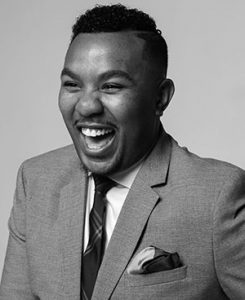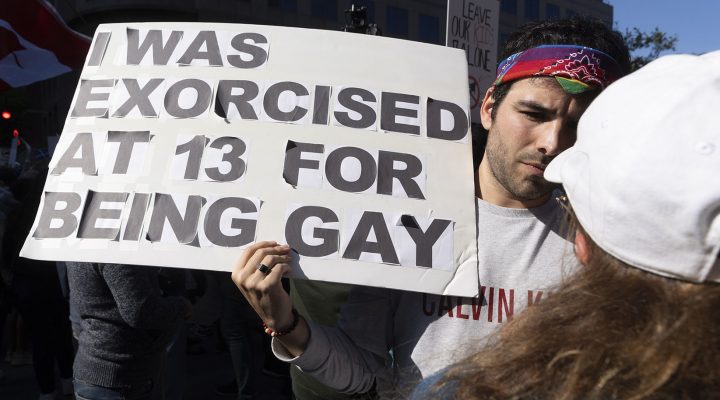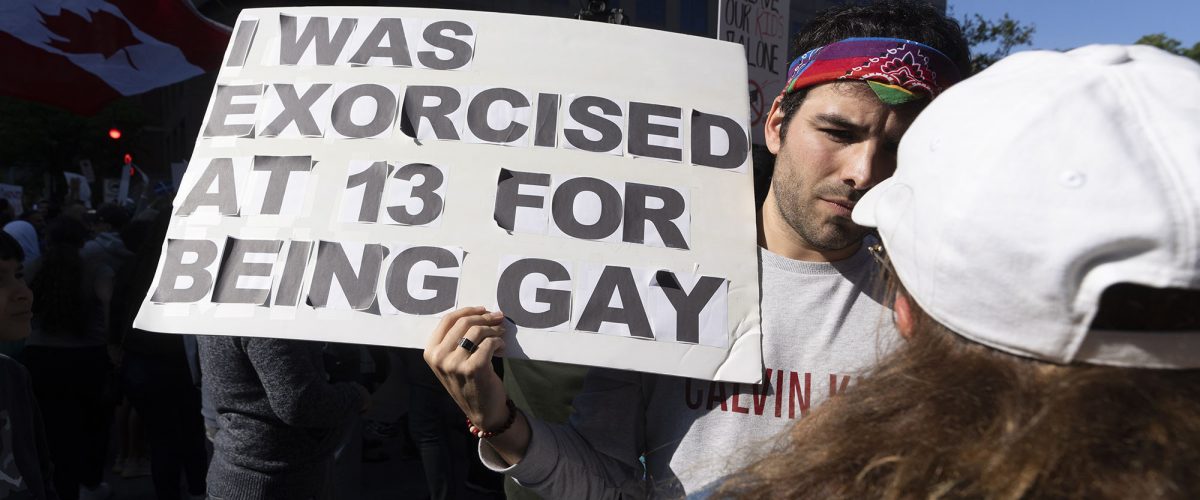The assault on LGBTQ liberties by far-right Republicans in Congress will widen to other marginalized groups if conservatives are successful passing trans- and homophobic measures, activist Jon Cohen said during a recent episode of the Interfaith Alliance’s “State of Belief” podcast.

Jon Cohen
“It’s a reminder that if you are not part of this white, straight Christian national majority, whether that makes you Jewish, Muslim, queer or trans, you could be next on the chopping block,” said Cohen, director of community mobilization at Keshet, a nonprofit that advocates for the rights of LGBTQ Jews and their families.
Cohen was joined by other LGBTQ rights advocates on the podcast moderated by Interfaith Alliance President Paul Raushenbush. The discussion largely focused on current threats and faith-based activism to resist the agenda of MAGA Republicans on Capitol Hill.
“This really is everyone’s fight, and we all need to be in it together, even if we may not feel like we are being targeted at this exact moment,” Cohen said. “As we’ve seen historically, it doesn’t just stop. This kind of discrimination, these kind of attacks on people’s identities and lived experiences, just continue to snowball and to grow.”
In Congress, that bigotry has been expressed through dozens of anti-LGBTQ legislative amendments to cut Medicare benefits to transgender people, ban displays of the Pride flag at federal buildings, reduce the salaries of transgender federal workers and ban abortion, said Darcy Hirsh, senior director of policy and advocacy at the Interfaith Alliance.
Presence of such riders on bills has impeded the progress of appropriations measures and nearly led to an Oct. 1 government shutdown. California Republican Kevin McCarthy’s resultant removal as House speaker was orchestrated by a core group of hard-right House members angry at his support for the short-term funding measure passed to avoid a federal shutdown.

Darcy Hirsh
While the podcast was recorded before the shutdown was avoided, Hirsh noted the continuing introduction of anti-LGBTQ amendments is setting the stage for conflict in Congress and in the 2024 presidential election.
“There are all kinds of these cultural-war issues that are being included in the federal appropriations process that are just so unheard of, and I would say even mean-spirited,” she said. “This is all part of a Christian nationalist playbook, and if we allow things like anti-trans health care riders to be included in the budget, we are normalizing and accepting this kind of discrimination and this kind of rhetoric.”
Republicans are beginning to see the strategy as a winning one, Cohen added. “We already see that in playbooks across the country. We can be shocked and we can be dismayed, but we can’t be surprised because of the way LGBTQ lives have been weaponized in this current political moment.”

Allen Morris
Once way to resist is to continually humanize the community under assault, said Allen Morris, policy adviser at the National LGBTQ Task Force. “We have to work both sides of the aisle. Yes, this is primarily a GOP issue; however, Democrats often fall on the wrong side of history. Democrats can be as hurtful as a Republican member. And I think when we look at how trans people are being crucified in so many different ways, it is very hurtful because oftentimes we do feel like our backs are up against the wall.”
Raushenbush pivoted the conversation to the 2024 election: “And how do we highlight issues at the intersection of religion and democracy in ways that humanize people and don’t allow religion to be used to bludgeon and discriminate against people?”
Cohen said bludgeoning is what conservatives are all about leading into the election. “If you had to just encapsulate Trump’s playbook, it’s us versus them. And if they win, we’re gone. Which obviously inspires fear, hatred, desperation and terrible results.”
“Put your listening ears on and think about what the candidates are talking about.”
Hirsh urged paying close attention to the rhetoric of local, state and national candidates. “How are they talking about the LGBTQ community? How are they talking about minority faiths? How are they talking about books and curriculum? It’s all connected. How are they talking about reproductive rights? As I would say to my kids, put your listening ears on and think about what the candidates are talking about. If we are not voting with our morals and really lifting up the voices of communities that are being discriminated against, and showing our candidates and elected officials who we are and what we care about, then we have a lot to be concerned about in the election.”
Morris acknowledged that keeping track of the opposition and constantly pushing back can be exhausting and disheartening. “It is hard to keep up with so much disinformation and misinformation.”
It’s also important to oppose the right-wing claim that LGBTQ people are devoid of religious faith or values, Cohen said. At Keshet, the goal is to get the wider Jewish community involved in supporting LGBTQ causes at the state and federal levels.
“It really is bringing a Jewish perspective to LGBTQ rights and saying that it is not despite our faith that we support LGBTQ non-discrimination, but it’s actually a piece of our faith and a core value that all people should be treated with respect and dignity,” Morris said.
It is important to engage communities of faith in the struggle for LGBTQ equality, Raushenbush added. “This is such an important theme for us. It’s not religion versus LGBTQ rights. That’s completely a false narrative. In fact, the majority of religious traditions almost across the board support LGBTQ equality. This old narrative has stuck around too long.”


